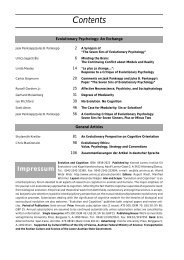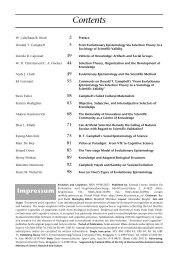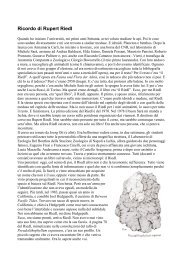Contents - Konrad Lorenz Institute
Contents - Konrad Lorenz Institute
Contents - Konrad Lorenz Institute
Create successful ePaper yourself
Turn your PDF publications into a flip-book with our unique Google optimized e-Paper software.
Darwin and Descartes’ Demon<br />
task in providing a DARWINIAN account of the objective–subjective<br />
distinction is to specify how the capacity<br />
to make this distinction might link to adaptive<br />
voluntary behaviour.<br />
In brief, my suggestion is this: Real and imagined<br />
stimuli typically call for different behavioural responses.<br />
Veridical perceptions often require an immediate<br />
response, whereas sensory imagery does<br />
not. As a result, it is necessary for an agent to discriminate<br />
objective from subjective states (or rather,<br />
subjective states that correspond to objective circumstances<br />
from subjective states that do not). People<br />
unable to differentiate between the subjective<br />
and the objective with a reasonable degree of reliability<br />
would either fail to respond to many important<br />
elements of their environments, or inappropriately<br />
respond to imagery and explicit memories as if<br />
it were real. This would clearly put them at a selective<br />
disadvantage. Individuals capable of making<br />
the distinction reliably would typically have survived,<br />
reproduced, and aided kin more successfully<br />
than those who were not, and thus the genes underlying<br />
this capacity would have increased in frequency<br />
relative to alleles.<br />
Admittedly, veridical perceptions are usually<br />
more detailed and complex than mental imagery,<br />
and it might be argued that there is little danger that<br />
the one could be mistaken for the other. However,<br />
the differences between perception and imagery do<br />
not mean that the subjective–objective distinction<br />
is unnecessary; they just mean that the distinction<br />
may usually be easy to make. Indeed, the level of detail<br />
and complexity of our experience may be one<br />
means by which the perceptual system ‘decides’<br />
whether a given aspect of brain activity should be<br />
classed as objective or as subjective. Derealization<br />
may involve the temporary malfunctioning of the<br />
mechanism involved in making this decision: The<br />
brain may misclassify genuine perceptual material<br />
as mere mental imagery. Conversely, the auditory<br />
hallucinations commonly found in individuals suffering<br />
schizophrenia may be a product of the misclassification<br />
of one’s own inner speech as an objective<br />
aspect of the external world (HADDOCK/TARRIER/<br />
SPAULDING 1998; see FRITH/DOLAN 1996, for an account<br />
of the neurological correlates of this clinical<br />
deficit).<br />
So, the evolutionary function of the objective–<br />
subjective distinction may relate to the fact that perceptual<br />
states require different behavioural responses<br />
than mental imagery. This suggestion takes<br />
the use of mental imagery in human thought as a<br />
given. Clearly, though, this is also something that<br />
must be explained, and a DARWINIAN explanation<br />
may be appropriate. Without going into too much<br />
detail about this matter, which is beyond the scope<br />
of the present exploration, it is plausible that the<br />
ability to use explicit memories and mental imagery<br />
in thinking evolved as a result of its contribution to<br />
long-term behavioural planning. Whatever the reason,<br />
though, the link between this ability and the<br />
subjective–objective distinction has several implications.<br />
First, it allows us to look more deeply into the<br />
evolutionary origins of the capacity to distinguish<br />
between the objective and the subjective. It can be<br />
presumed that the capacity for image-based<br />
thought must have evolved hand-in-hand with the<br />
capacity to distinguish veridical perception from<br />
mere imagery. Therefore, the subjective–objective<br />
distinction may ultimately have been selected because<br />
it made possible mental imagery and explicit<br />
memory. Second, it seems unlikely that most other<br />
animals use mental imagery or explicit memories in<br />
their behavioural planning, and thus we would not<br />
expect them to make the objective–subjective distinction.<br />
It may be difficult for us to imagine, but it<br />
is possible that most other animals perceive their environment,<br />
but do not ‘label’ their perceptual states<br />
as objective. This is not to say that they experience<br />
them as subjective; instead, they may simply not<br />
make the distinction.<br />
It is important to stress that I am not arguing for<br />
the ultimate validity (or otherwise) of the objective–<br />
subjective distinction, or that every aspect of mental<br />
life can be placed neatly and unambiguously<br />
into one or the other category. My suggestion is simply<br />
that the distinction may have an evolutionary<br />
origin. This position only requires that the distinction<br />
is valid enough to be useful, and that in evolutionarily<br />
relevant cases, people will usually class a<br />
given aspect of mental experience in the same way.<br />
For example, when there really is a tiger present,<br />
most people in most cultures will class the resulting<br />
perceptual experience as veridical and objective,<br />
rather than as a memory or mental image.<br />
Mind-Independence<br />
Another reason that it is necessary to differentiate<br />
between the objective and the subjective is this: It is<br />
often adaptively useful to track the continued existence<br />
of objective aspects of the world that are beyond<br />
the range of the senses, whereas this does not<br />
apply in the case of sensory imagery. The ability to<br />
track aspects of the environment is widespread in<br />
the biological world. 1 DENNETT (1991) goes so far as<br />
Evolution and Cognition ❘ 125 ❘ 2003, Vol. 9, No. 2








